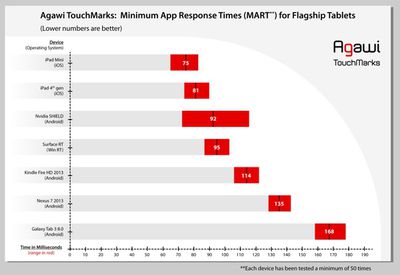iPad Mini and Fourth-Generation iPad Have Most Responsive Tablet Touch Screens
The iPad mini and the fourth-generation iPad have the most responsive touch screens, according to a new set of TouchMark benchmarks from cloud streaming company Agawi.
In its latest TouchMark test, Agawi tested the screen latencies of several different tablets, including the iPads, the Microsoft Surface RT, the Kindle Fire HD, the Nexus 7, the Galaxy Tab 3, and the Nvidia SHIELD.
Apple's iPad mini had the lowest Minimum App Response Time (MART), coming in at 75 milliseconds. The fourth-generation iPad came in second at 81, and the fastest Android tablet was the NVIDIA Shield at 92. Samsung's Galaxy Tab 3 had the worst response time, at 168 milliseconds.

In a result that's perhaps now unsurprising, the iOS devices are more responsive than its competitors. Interestingly, the iPad mini – with its smaller screen and 1024×768 resolution – performs similarly to the larger fourth generation iPad and its 2048×1536 resolution, suggesting that responsiveness is not reduced by the larger screen size or resolution.
Our previous speculations continue to apply – more responsive devices may process touches earlier in the stack, poll for touches more frequently or have touchscreens optimized or calibrated to be more responsive. In our latest review of our test apps, we discovered an optimization that suggests that the GPU or GPU drivers in the devices might also add significant latency.
To obtain MART scores for each of the tablets, Agawi used a 240fps high frame rate camera along with a custom-built device called a Touchscope. The MART is the latency experienced between the time that a user touches the device display to the device's on-screen response time.
Previously, Agawi measured the response time of Apple's iPhone 5 compared to several other Android and Windows smartphones, with the iPhone 5 demonstrating a MART time of 55 milliseconds, which is significantly faster than even its own iPads.
Popular Stories
iOS 19 will not be available on the iPhone XR, iPhone XS, or the iPhone XS Max, according a private account on social media site X that has accurately provided information on device compatibility in the past.
The iPhone XR, iPhone XS, and iPhone XS Max all have an A12 Bionic chip, so it looks like iOS 19 will discontinue support for that chip. All other iPhones that run iOS 18 are expected...
Apple today released watchOS 11.4, the fourth major update to the operating system that runs on the Apple Watch. watchOS 11.4 is compatible with the Apple Watch Series 6 and later, all Apple Watch Ultra models, and the Apple Watch SE 2.
watchOS 11.4 can be downloaded on a connected iPhone by opening up the Apple Watch app and going to General > Software Update. To install the new software,...
Apple today released new firmware updates for all AirPods 4 and AirPods Pro 2 models. The new firmware is version 7E93, up from the 7B21 firmware that was installed on the AirPods Pro 2 and the 7B20 firmware available on the AirPods 4 and AirPods 4 with ANC.
It is not immediately clear what new features or changes are included in the new firmware, but we'll update this article should we find ...
Apple today released iOS 18.4 and iPadOS 18.4, the fourth major updates to the iOS 18 and iPadOS 18 operating system updates that came out last year. iOS 18.4 and iPadOS 18.4 come two months after Apple released iOS 18.3 and iPadOS 18.3.
Subscribe to the MacRumors YouTube channel for more videos.
The new software can be downloaded on eligible iPhones and iPads over-the-air by going to...
While the iPhone 17 Pro and iPhone 17 Pro Max are not expected to launch until September, there are already plenty of rumors about the devices.
Below, we recap key changes rumored for the iPhone 17 Pro models as of March 2025:
Aluminum frame: iPhone 17 Pro models are rumored to have an aluminum frame, whereas the iPhone 15 Pro and iPhone 16 Pro models have a titanium frame, and the iPhone ...
Visa wants to pay Apple approximately $100 million to be the new payment network for the Apple Card, reports The Wall Street Journal. As of right now, the Apple Card is on the Mastercard payment network, but that is set to change because Apple is ending its partnership with Goldman Sachs.
Both American Express and Visa are vying to replace Mastercard as Apple's card services provider, while...
Apple today seeded the first betas of upcoming iOS 18.5 and iPadOS 18.5 updates to developers for testing purposes, with the software coming just two days after Apple released iOS 18.4 and iPadOS 18.4.
iOS 18.5 and iPadOS 18.5 can be downloaded from the Settings app on a compatible device by going to General > Software Update.
We don't yet know what Apple is introducing in the iOS 18.5...






















